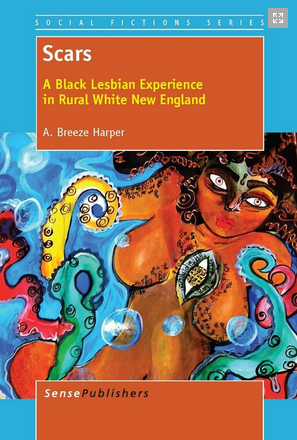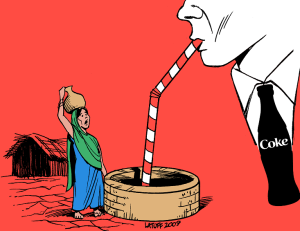 I recently had the pleasure of reading Dr. Breeze Harper’s new fiction publication, Scars: A Black Lesbian Experience in Rural White New England and feel confident recommending the book for newcomers to intersectional theory, undergraduate students studying feminism, critical race, and other social justice issues, and seasoned advocates and scholars who might enjoy a fictional break that speaks to their interests. A trigger warning is in order because, as the title warns, Scars deals with many uncomfortable topics and visceral experiences, including racism, domestic violence, child molestation, and rape.
I recently had the pleasure of reading Dr. Breeze Harper’s new fiction publication, Scars: A Black Lesbian Experience in Rural White New England and feel confident recommending the book for newcomers to intersectional theory, undergraduate students studying feminism, critical race, and other social justice issues, and seasoned advocates and scholars who might enjoy a fictional break that speaks to their interests. A trigger warning is in order because, as the title warns, Scars deals with many uncomfortable topics and visceral experiences, including racism, domestic violence, child molestation, and rape.
Although the concepts that shape the book are acute, Scars is an engaging read that both entertains and educates. The main character, Savannah (Savi), is a young college student that we can all look up to. As a poor white girl from Appalachia, I sat mostly silent in the classroom, absorbing what I was taught without question. So, for me, Savi instantly becomes a hero of critical thinking as she challenges the white male normativity of the privileged world around her. She courageously speaks out against post-racial ideologies and the micro-aggressions of her more privileged peers, even when her friends and classmates resist. Savi is a little radical, and I love it.

Dr. Breeze Harper
But Savi isn’t a perfect superhero. She is certainly human, facing many structural barriers due to her race, class, and sexual orientation. Brave in some situations, she is scared and vulnerable in others. Her experience with racial slurs as a small child is heartbreaking. Her terrifying experience with a sexually aggressive customer alone in the gas station where she works brings chills. Her debilitating concern for her mother’s health and the constant burden of bills and cold temperatures reminds readers of the stark realities of difference in America.
There is also something to be said of the tension Savi faces in experiencing oppression. At times she is scrappy and outspoken, tackling challenges head on. Oftentimes, however, confrontation is pushed onto her and she feels quite helpless. We see this when she is engaged by her white male classmate who seeks Savi’s counsel in understanding his privilege, but we also see it with her struggle to come to grips with her lesbianism and the pressure to “come out” before she feels ready. Rarely does she feel comfortable admitting weakness and accepting help.
The book’s primary strength relies in its ability to carefully tackle the intricacies of oppression. Her best friend, who is hearing disabled, often engages his male privilege and abuses their friendship with near constant pressure for a relationship, seemingly unable to understand that no means no. Savi herself faces a considerable level of structural oppression, but she comes to recognize that she also maintains some degree of privilege as a human and as a Westerner. She learns that Coca-Cola is responsible for serious social and environmental injustices, but doesn’t want to give it up, so she creates rationalizations. Though she is lactose-intolerant, she continues to eat animal flesh and balks at the thought of giving up McDonald’s.
 None of the characters are perfect in understanding oppression; everyone is still learning. We see this in Savi’s heavy use of sexist and disableist language, the fetishization of animal bodies as food by most of the characters, and her vegan friend’s wool clothing. Oppression is never straight forward, and Scars helps readers to navigate these complicated concepts and relationships.
None of the characters are perfect in understanding oppression; everyone is still learning. We see this in Savi’s heavy use of sexist and disableist language, the fetishization of animal bodies as food by most of the characters, and her vegan friend’s wool clothing. Oppression is never straight forward, and Scars helps readers to navigate these complicated concepts and relationships.
When all is said and done, Scars is not a doom-and-gloom story. Harper is careful to point out bright spots, altruism, and room for hope. There are characters that are willing to learn, and many individuals seek to disrupt violence in any way they can. Although there are definitely hierarchies of privilege, no character lives unburdened from some sort of systemic barrier or personal tragedy. Everyone has scars, but everyone has the potential to heal.
 Dr. Wrenn is Lecturer of Sociology and past Director of Gender Studies (2016-2018) with Monmouth University. She received her Ph.D. in Sociology with Colorado State University in 2016. She received her M.S. in Sociology in 2008 and her B.A. in Political Science in 2005, both from Virginia Tech. She was awarded Exemplary Diversity Scholar, 2016 by the University of Michigan’s National Center for Institutional Diversity. She served as council member with the American Sociological Association’s Animals & Society section (2013-2016) and was elected Chair in 2018. She serves as Book Review Editor to Society & Animals and has contributed to the Human-Animal Studies Images and Cinema blogs for the Animals and Society Institute. She has been published in several peer-reviewed academic journals including the Journal of Gender Studies, Feminist Media Studies, Disability & Society, Food, Culture & Society, and Society & Animals. In July 2013, she founded the Vegan Feminist Network, an academic-activist project engaging intersectional social justice praxis. She is the author of A Rational Approach to Animal Rights: Extensions in Abolitionist Theory (Palgrave MacMillan 2016).
Dr. Wrenn is Lecturer of Sociology and past Director of Gender Studies (2016-2018) with Monmouth University. She received her Ph.D. in Sociology with Colorado State University in 2016. She received her M.S. in Sociology in 2008 and her B.A. in Political Science in 2005, both from Virginia Tech. She was awarded Exemplary Diversity Scholar, 2016 by the University of Michigan’s National Center for Institutional Diversity. She served as council member with the American Sociological Association’s Animals & Society section (2013-2016) and was elected Chair in 2018. She serves as Book Review Editor to Society & Animals and has contributed to the Human-Animal Studies Images and Cinema blogs for the Animals and Society Institute. She has been published in several peer-reviewed academic journals including the Journal of Gender Studies, Feminist Media Studies, Disability & Society, Food, Culture & Society, and Society & Animals. In July 2013, she founded the Vegan Feminist Network, an academic-activist project engaging intersectional social justice praxis. She is the author of A Rational Approach to Animal Rights: Extensions in Abolitionist Theory (Palgrave MacMillan 2016).
